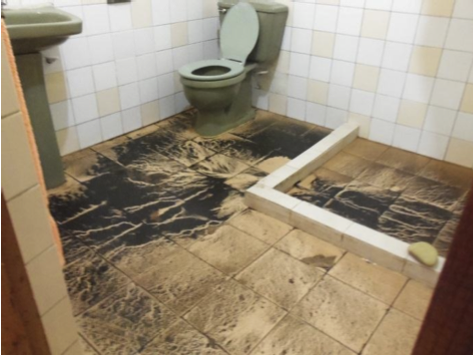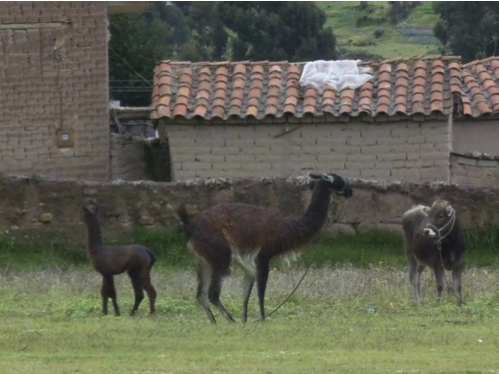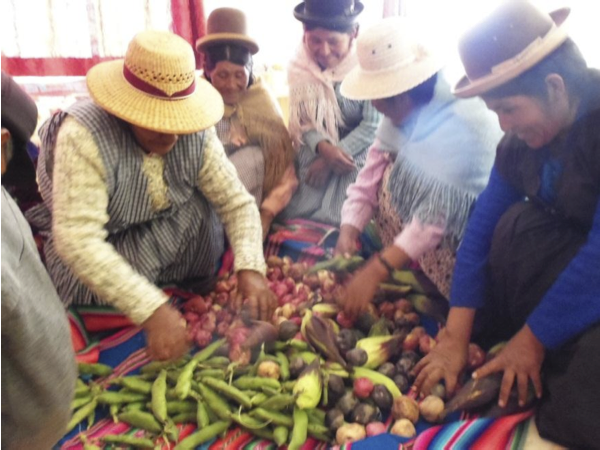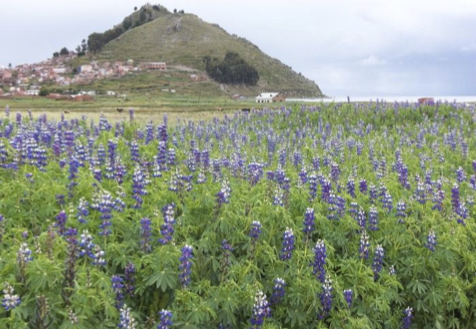Copacabana Cornucopia
 The house flooded again, so Jeff stayed home to clean, and I kept our date with Froilan Mamani Quispe, Director of the Cusijati School, for a one- day trip to La Paz.
The house flooded again, so Jeff stayed home to clean, and I kept our date with Froilan Mamani Quispe, Director of the Cusijati School, for a one- day trip to La Paz.
We were going there to research prices for internet service for the school’s computers. In our last newsletter, we mentioned that the school doesn’t have internet service for its seven aging computers. Froilan had asked if Mision Fronteras would cover the cost of a greenhouse roof and the initial costs for internet service. He gave us a detailed, written proposal: Produce from the greenhouse and income from resident user fees would sustain internet service in future months -- we all hoped. To actually know, we needed to get prices.
 Alas, of the three internet providers in Bolivia, one doesn’t serve the Copacabana area and the other two were impossibly expensive – they’d both have charged over $400 U.S per month. The school could never sustain that.
Alas, of the three internet providers in Bolivia, one doesn’t serve the Copacabana area and the other two were impossibly expensive – they’d both have charged over $400 U.S per month. The school could never sustain that.
For Froilan and me, it was a glum bus ride back to Copa. When I got home that night, Jeff told me he'd heard a surprising announcement on the local radio station: Mision Fronteras has paid for Internet service for the Cusijata School! Apparently, someone in Cusijata jumped the gun. That was more bad news, and a serious problem. It created the impression that the mission is both wealthy, and free with money. Neither is true.
Jeff and I turned that gaff into an opportunity to teach, again, that every project the mission helps launch begins with at least 20% community buy-in, and a written proposal that includes a business plan showing how the project will become self-sustaining.


The remains of the old greenhouse and the meeting with Director Froilan in his office
Froilan had done a great job with his proposal. And Cusijata residents are eager and resourceful in how they will help support the effort. For example, a tree fell during the heavy rains and mudslides; they will saw it into roof supports for the greenhouse. But with the unexpectedly high quotes for service, Froilan, Jeff and I worried that the project might collapse. We suggested Froilan find out how hostels and hotels provide internet for their customers.
 A week later he showed up at our house, vibrating with excitement. He'd learned that the Catholic University of Copacabana gets its wi-fi signal from a provider in Peru! Recall, the border is only 4 miles from Copacabana. Amadeo, the director of the university, is a friend of ours. He is willing and able to "sell" a connection to their signal. It will cost about $60 U.S. for the equipment, $115 for installation, and only $100 per month for the service!
A week later he showed up at our house, vibrating with excitement. He'd learned that the Catholic University of Copacabana gets its wi-fi signal from a provider in Peru! Recall, the border is only 4 miles from Copacabana. Amadeo, the director of the university, is a friend of ours. He is willing and able to "sell" a connection to their signal. It will cost about $60 U.S. for the equipment, $115 for installation, and only $100 per month for the service!
That is sustainable! Hooray!!
Froilan, Jeff and I were to meet with Amadeo Monday afternoon of this week, at 4, to hammer out details. I'd been gardening all afternoon, so I hopped in the shower at 3:15. Just then, someone banged at the gate. I could hear Jeff saying in Spanish, "The meeting's at four, right?" I couldn't hear the reply, but I sensed there would be a pre-meeting, now, at our house, with more people than just Froilan.
I raced through my shower, jumped, dripping, into my clothes, and stepped into the foyer to greet Froilan, three other Aymaran men, and four Aymaran women. The women were all bent under heavily loaded aguayos, the brightly colored "hauling blankets" that people — almost exclusively women — here use to carry everything from boulders, to babies, to bounty from the fields. The loaded aguayos struck us as odd, but we figured maybe they had all just come from the market in Copa.
We all sat in a circle in our family room and listened to Froilan explain the newly revised, vastly less expensive proposal. Suma, one of our dogs, bounded from one to the next, lapping up attention, which was probably heightened by her Aymaran name. There were questions, answers, translations to and from Aymara, and many smiles. Two more women showed up, also burdened with heavy, fully loaded aguayos.
 The moment business ended one of them spread an aguayo on the floor. She and all the other women deftly poured out the contents of their aguayos. A mountain of just-harvested, still-wet potatoes rose — small, black, chuños; chalky white chuños; white potatoes; brown ones; purple; pink; pink-and-white; speckly potatoes … the mound was knee-high!
The moment business ended one of them spread an aguayo on the floor. She and all the other women deftly poured out the contents of their aguayos. A mountain of just-harvested, still-wet potatoes rose — small, black, chuños; chalky white chuños; white potatoes; brown ones; purple; pink; pink-and-white; speckly potatoes … the mound was knee-high!
Then came the hava pods (like fava beans), and the choclo (corn). And finally, a bag of fresh, brown eggs. Altogether, they gave us about 50 pounds of havas and corn, and 70 pounds of potatoes. And 10 eggs. Wow!!!
I confess we kept a lot of the deliciously nutty, fresh-from-the-field, first-of-the-season havas, which we both adore! Even after sharing big bags of corn and potatoes with friends, we're still rich in spuds. Since Monday, we are daily eating our way through a flour sack full in our shed. Let's see … fried, mashed, in pancakes, baked and twice-baked, in a casserole, soup, stew, tossed in a salad … soufflé?
That reminds me, friends, please send us your favorite recipes for the Lake Titicaca Border Mission (fund-raiser) Cookbook!


Assessing the site for the new greenhouse on school grounds
And that brings me back to Cusijata School, one of the many projects for which we're trying to raise funds. With installation, equipment, and the first month's internet service fee, the trimmed-down total is just $275. If you're interested in "adopting" this project as a "Virtual Mission*," grounded on local folks' resourcefulness, their donations in-kind, and hard work aimed at better educating their kids and boosting their entire village, shoot us an email, please. If you're game to adopt the thriftily planned Cusijata greenhouse, a donation of $460 will pay for the roof, which will be made of more durable, less expensive, but equally effective rigid plastic, rather than plastic sheeting. And: you'll get your name on a plaque on the greenhouse! Not only that, we'll regularly send you photos and videos of work in progress, and we'll gladly link you to students, parents and teachers via Skype; reception's great in Cusijata.


Lupines, grown for their edible legumes, are just some of the beauty of rainy season we get to enjoy on our walks to and from Cusijata. In the pic at right, Copacabana and Calvario rise in the background.
A flour sack full of thanks to all our donors, past and recent, and to all of you who support us and the work of Mision Fronteras, in many ways.
Let us hear from you, amigos!
Deb and Jeff
*A "Virtual Mission" is an idea meant for groups — families, a class of students, co-workers, book clubs, a bowling or other sports team, for example — to sponsor a specific project by sending a donation in lieu of a working mission team. We'll hire local workers at fair rates (good for the economy!) to get the job done, and we'll regularly send your group photos and video updates, and connect North and South Americans via Skype, if possible. See our early February 2012 newsletter for more info.
- Debbie Rissing's blog
- Log in to post comments
God, as known to us in Jesus Christ, welcomes all.
We welcome people of any race, national origin, ethnicity, gender, sexual orientation, age, social or economic status, employment status, or life situation; including people with physical or mental illness or disability.
We practice loving acceptance of each person and respectful discussion
 of our differences.
of our differences.
Affiliated to Reconciling Ministries Network
Recent News
Sunday Worship Service - July 30 at 10:00 am
July 30, 2023 - 9:51am
Sunday Worship Service - July 23 at 10:00 am
July 23, 2023 - 9:48am
Sunday Worship Service - July 16 at 10:00 am
July 16, 2023 - 10:17am
Vacation Bible School
July 14, 2023 - 10:10pm
Sunday Worship Service - July 9 at 10:00 am
July 9, 2023 - 9:53am






